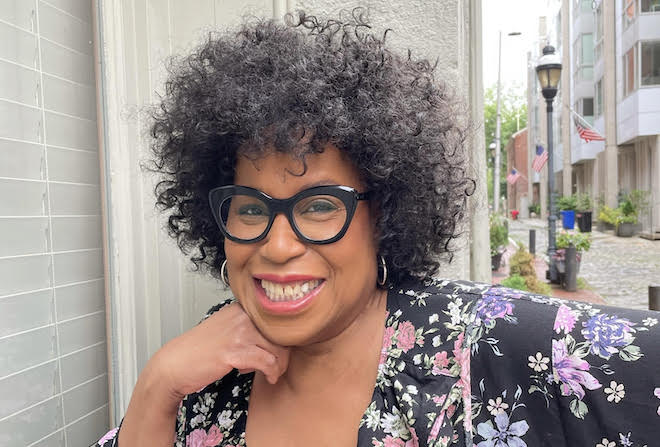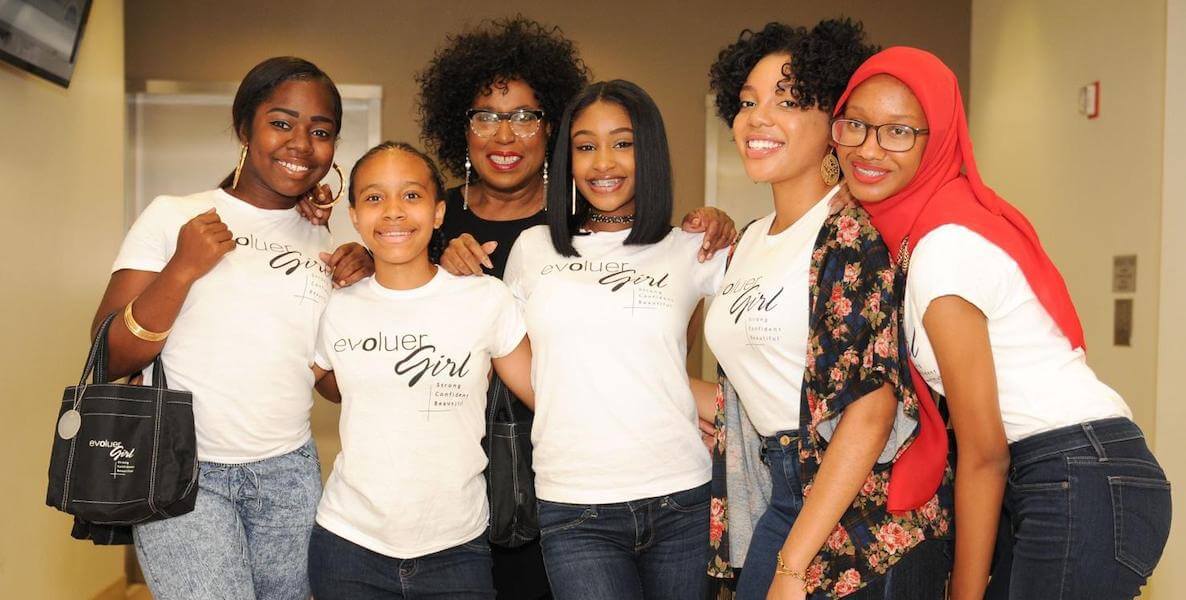Cheryl Ann Wadlington founded Evoluer House in 2004 in Philadelphia with 24 cents in the bank and a desire to fulfill needs of and rectify disparities for girls of color. Today, Wadlington’s dream project has served 3,000 girls. All have graduated high school and gone on to college, and 75 percent attended the program’s workforce development program and got a job before graduating from college.
It’s been a labor of love for Wadlington, a Philadelphia native whose own life’s hardest times were in high school. And she’s not done yet.
A family of activists
Wadlington was born into a family of activists. Her mother worked with Dr. Martin Luther King Jr., and her brother advocated for solutions to HIV/AIDS in the 1980s.
“I grew up watching them protest, fight for equal rights, and make sure that everybody had access to the medical services that they needed when AIDS hit like crazy in the 80s,” she recalls. “I come from a religious household where it was your duty to give back.”
Nonetheless, Wadlington says she was a troubled child. A daddy’s girl, she lost her father when she was just six years old. “In the African American communities, they didn’t believe much in therapy,” she says. “My mom always thought that church could heal everything. That’s how Black people thought. Well, a lot of ’em.”
But neither church nor therapy worked for Wadlington. She started getting in trouble, fighting, and wound up in reform school. When she graduated, she wanted to go away to college, but she didn’t have the grades. Instead, she stayed local and attended Community College of Philadelphia. Upon graduation, she recalls, “people in the community were so willing to wrap their arms around me, help me and see to it that I succeeded.” She’d never forget the power of that communal embrace.
Evoluer’s goal was always to keep the girls in school and prepare them for both college and a world that did not necessarily look like the places they’d been.
With the support of friends and family back home, she headed to New York to study at the Fashion Institute of Technology and stayed in the city to work as a freelance reporter and editor for Essence Magazine, Black Entertainment Television (BET), Black Enterprise Magazine and New Generation in London.
Becoming well accomplished in a high-pressure field made Wadlington realize if she could do it, she could help young girls who were like her do it, too. The idea for Evoluer House was born.
Back to Philly
So, she left New York for home, with a referral from former Camden, NJ Mayor Gwendolyn Faison. Faison thought she’d be a good fit to provide an empowerment program for underserved girls for the city’s Department of Community Relations. It was not a 9-to-5 job. “I went in to start one program, and within a week they gave me about 15 community centers and housing authorities to oversee,” she recalls. She learned a lot.

When the program’s funding diminished, Wadlington spoke to a Philadelphia City Councilmember about the City’s lack of programming and extracurricular activities tailored specifically to girls. This led to a partnership with Parks and Recreation, where Wadlington oversaw empowerment programs at 20 rec centers.
Her charge: Help underserved teen girls of color graduate high school on time, attend four-year college — and break the cycle of intergenerational poverty. No small tasks. Luckily, Cheryl Ann Wadlington was (and is) incredibly ambitious.
The evolution of Evoluer House
Organizing the program at the rec centers was pure joy for Wadlington, she says, and it came naturally to her, although the programs (then and now) employed standardized, evidence-based curricula. She arranged for classes to take place three days a week for about eight weeks. Each class consisted of 25 to 30 teenage girls.
A few years on, she decided to move the program to a single location — Peirce College in Center City. The city rec centers, in her opinion, felt too unsafe for her girls. Inspired by progressive and philanthropic colleagues from the Côte d’Ivoire, she decided to name the program “Evoluer House.” Evoluer is French for “evolve.” Evoluer House would remain at Peirce for the next 11 years.
Wadlington hired professional instructors and educators to come in after school in the spring and fall and in the day during the summer to teach girls ages 13 to 18 whom she’d recruited through schools, social service agencies, churches, shelters and boarding homes.
Evoluer’s goal was always to keep the girls in school and prepare them for both college and a world that did not necessarily look like the places they’d been. To this end, they developed programs on personal wellness and self-care, suicide prevention, sexual health and healthy relationships, and workforce development.
Empowering at Evoluer
Wadlington says issues that impact teenage girls of color are nonstop. “We’re talking about sex trafficking, mental health issues — which is getting worse in terms of the teen girl’s brain being able to develop because of the impact of video and certain things that they’re seeing now in pop culture,” she says. Do you see all these young girls with soft eyelashes on? she asks. “That’s horrible to me. This is some new stuff. And just because things are new in pop culture, we do not have to accept them.”
Wadlington regards sexualization and adultification of girls in both the real world and online as a cause of many problems, not the least of which is low self-esteem. “We are fighting a big machine — and that’s the social media machine.”
The key to empowering girls to see beyond themselves, she says, is, “You really have to break things down to ’em. And we have a lot of conversations with our girls. We don’t talk to them. We talk with them, because that’s the only way they’re going to understand and start to think critically.”
Evoluer House’s programs and curriculum are educator-designed and evidence-based. Still, says Wadlington, “What we’re finding is that before you can educate, you really need to heal in order to raise a powerful girl. And that’s what our mission is — to raise powerful, smart girls.”
Becoming well accomplished in a high-pressure field made Wadlington realize if she could do it, she could help young girls who were like her do it, too. The idea for Evoluer House was born.
The task is not an inexpensive one. Like so many Black-run and POC-serving organizations, Evoluer House has struggled to stay afloat. Today, funders such as Drexel University, PricewaterhouseCoopers, Aramark, Alliance for Strong Families and Communities, and the W.K. Kellogg Foundation help mitigate costs for courses like Stackin’ the Benjamins (financial skills development), Going to College Like a Savage (college prep), Healthy Girl Summer (health and wellness) and resume writing.
In 2020, soon after Covid forced Evoluer House to go virtual, Wadlington was honored as one of nine L’Oreal Paris Women of Worth. “It was a cathartic moment for me because I had worked in the fashion and beauty industry for years,” she says. The pandemic prompted NBC to televise the awards. “That gave our mission even wider exposure, so that was just a blessing.” Today, Evoluer House — still online only — signs up girls from across the country. Recently, they enrolled their first international student, from Liberia.
The attention, funding and accolades help keep Wadlington and Evoluer House going. But it’s the girls who’ve been through the program who inspire her back to work every morning.
Evoluer girls
Alexis Walker attended Evoluer as a junior at Central High School. She graduated in the Evoluer class of 2019. “The program made me more independent. It taught me how to be more productive during the day when it comes to schoolwork, as well as (how to improve) my mental health and physical health,” she says. “It taught me how to communicate with others in the workforce and while networking.” In 2021, Walker became an instructor’s assistant for the virtual summer program.
She is now at West Chester University, where in five years, she’ll receive a bachelor’s in sports medicine and a master’s in athletic training.
Corey Stewart graduated from the very first Evoluer Program in August 2004, back when it was held at three different rec centers. She recalls a variety of lessons. “I learned leadership skills,” she says, “I learned etiquette. I learned what it meant to be in a career. I also learned how to network, and how to be more well-rounded.”
Stewart went on to graduate from Lincoln University with a major in political science and minor in sociology. For the past 10 years, she’s taught high school English in Philly, most recently, at Imhotep Charter High School.
Stories like these get Wadlington through her very hectic days. As she gears up for summer, she’s looking to recruit 50 new students — while helping the young people she’s already worked with. “You’re just dealing with all of the stories that you hear that may be impacting families and girls,” she says. All this does not drain her. In fact, she feels fantastic.
Her most recent goal: “We’re working for Evoluer House to be considered the Harvard University of development schools for girls of color.”
![]() MORE ON YOUTH PROGRAMS
MORE ON YOUTH PROGRAMS



